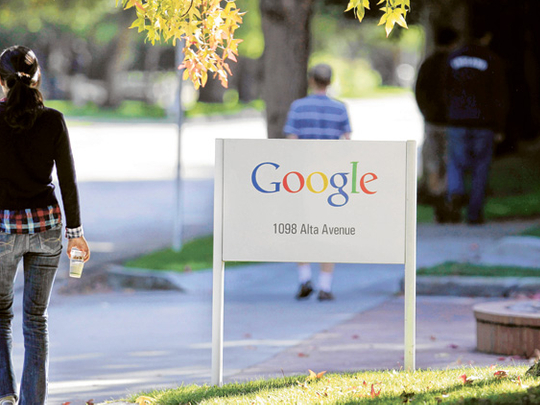
San Francisco Google Inc's decision to give all of its 23,300 employees a 10 per cent pay raise next year — and a $1,000 (Dh3,670) bonus to boot — is just the latest volley in what has become a full-fledged war for top Silicon Valley talent.
With engineers in short supply, technology companies are competing for employees who can write the software programs needed for new products and services. And they're increasingly stealing them from one another.
Google is particularly vulnerable. The internet search giant, long known for aggressively recruiting the smartest in the business, is under siege from Facebook Inc and other competitors that are trying to lure them away.
A few weeks ago, Lars Rasmussen, the brainy co-founder of Google Maps and a six-year Google veteran, bolted for Facebook, joining more than 200 former Google employees who now work at the world's most popular social networking service.
Facebook tapped its most persuasive pitchman to close the deal. Founder and Chief Executive Mark Zuckerberg personally wooed Rasmussen to move halfway around the world from his Google office in Sydney, Australia, to Face-book's headquarters in Palo Alto.
Facebook could be "a once-in-a-decade type of company", the Danish-born computer science engineer said in explaining his decision.
That kind of talk rankles Google executives, who think they run the hottest company in Silicon Valley. With 2,000 employees, Facebook is a much smaller operation than Google. Even so, 1 in 5 employees can list "Google" somewhere on their resumes, including Chief Operating Officer Sheryl Sandberg and Executive Chef Josef Desimone, who prepares fresh meals for Facebook employees.
Facebook says its recruiters don't target Google; they seek out top candidates wherever they work. "For us, it's just important to find the best talent," said Thomas Arnold, Facebook's director of recruiting, who himself hails from Google. "If it comes from Google, that's great. If it comes from Hewlett Packard, that's great. If it comes from a start-up you have never heard of, that's great. If it's a kid sitting in a basement in small town somewhere who has created something neat on the web, that's even better."
The flight to Facebook is not a subject Google would discuss, though it did throw out a few counterpunches: Google's attrition, it said, remains below the industry standard. It hires more people every 10 days than Facebook has recruited in all from Google. And when Google makes a counteroffer to its employees, 70 per cent decide to stay at Google rather than leave for Facebook, the company said.
Training ground
"Google is an attraction and training ground for incredible talent," recruiter Paul Daversa said. "The question is: Can Google fill up on talent as fast as it's losing it?"
The skirmish for talent is driving up compensation and prompting a flood of offers and counteroffers. In one case, Google countered an offer from Facebook to a software developer with a promise of a 15 per cent bump to his $150,000 salary, a quadrupling of stock benefits and a $500,000 cash bonus to stay a year, according to people familiar with the situation. He still took off for Facebook.
Google is hardly alone as it tries to make itself as sticky as flypaper to prospective recruits and employees alike.
Despite California's unemployment rate of 12.4 per cent, tech job listings are up 62 per cent year over year in Silicon Valley, which has shown 11 straight months of growth, according to technology and engineering career website Dice.com. On any given day, companies are trying to fill 4,600 jobs on Dice.com, up from 2,800 open positions last year.
That reflects the strength of Silicon Valley's major tech companies, chiefly Google, Apple Inc and Facebook. Google dominates internet advertising, Apple rolls out one must-have gadget after another, and Facebook has taken flight with more than 500 million users.
Along with these companies, there are newcomers such as Zynga Gaming Network Inc, a San Francisco company that makes wildly popular social games on Facebook and elsewhere.
Zynga added 800 of its 1,200 employees in the last year alone.
With strong demand for their products and services, Silicon Valley companies have plenty of money to shower on signing bonuses and retention incentives. "We believe this trend will only accelerate in the next 18 months," Patrick Pichette, Google's chief financial officer, said on a call to discuss the company's strong third-quarter results.
"We strongly believe that the difference between the winners and the losers in our industry will be to a large extent determined by who can continue to attract and retain the very best people."
Venture capitalist Marc Andreessen, whose firm helps the companies it invests in recruit engineers and other key employees, says the supercharged recruiting market is the "single hardest challenge in Silicon Valley".
"A good engineer can easily have 10 job offers," Andreessen said.
All the top companies are poaching from the same pool: sought-after workers with a prized mix of engineering chops, ingenuity and initiative.
Promising prospects
They raid one another's ranks, mine colleges and universities for promising prospects and jump at unusual opportunities to nab engineers. As soon as news broke last week that Ask.com was laying off 130 people, job offers started popping up on Twitter.
In September, Feross Aboukhadijeh, a computer science major at Stanford University, bet his roommate that in one hour he could create software that would search YouTube in real time.
He lost the bet (it took him three hours) but YouTube Instant racked up 1 million users in 10 days, netting Aboukhadijeh a job offer from YouTube co-founder Chad Hurley. Aboukhadijeh, already an intern at Facebook, decided to take the job at YouTube while he continues his studies at Stanford.












